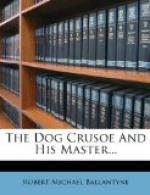Crusoe’s father and mother were magnificent Newfoundlanders. There was no doubt as to their being of the genuine breed, for Major Hope had received them as a parting gift from a brother officer, who had brought them both from Newfoundland itself. The father’s name was Crusoe, the mother’s name was Fan. Why the father had been so called no one could tell. The man from whom Major Hope’s friend had obtained the pair was a poor, illiterate fisherman, who had never heard of the celebrated “Robinson” in all his life. All he knew was that Fan had been named after his own wife. As for Crusoe, he had got him from a friend, who had got him from another friend, whose cousin had received him as a marriage-gift from a friend of his; and that each had said to the other that the dog’s name was “Crusoe,” without reasons being asked or given on either side. On arriving at New York the major’s friend, as we have said, made him a present of the dogs. Not being much of a dog fancier, he soon tired of old Crusoe, and gave him away to a gentleman, who took him down to Florida, and that was the end of him. He was never heard of more.
When Crusoe, junior, was born, he was born, of course, without a name. That was given to him afterwards in honour of his father. He was also born in company with a brother and two sisters, all of whom drowned themselves accidentally, in the first month of their existence, by falling into the river which flowed past the block-house—a calamity which occurred, doubtless, in consequence of their having gone out without their mother’s leave. Little Crusoe was with his brother and sisters at the time, and fell in along with them, but was saved from sharing their fate by his mother, who, seeing what had happened, dashed with an agonized howl into the water, and, seizing him in her mouth, brought him ashore in a half-drowned condition. She afterwards brought the others ashore one by one, but the poor little things were dead.
And now we come to the harrowing part of our tale, for the proper understanding of which the foregoing dissertation was needful.
One beautiful afternoon, in that charming season of the American year called the Indian summer, there came a family of Sioux Indians to the Mustang Valley, and pitched their tent close to the block-house. A young hunter stood leaning against the gate-post of the palisades, watching the movements of the Indians, who, having just finished a long “palaver” or talk with Major Hope, were now in the act of preparing supper. A fire had been kindled on the greensward in front of the tent, and above it stood a tripod, from which depended a large tin camp-kettle. Over this hung an ill-favoured Indian woman, or squaw, who, besides attending to the contents of the pot, bestowed sundry cuffs and kicks upon her little child, which sat near to her playing with several Indian curs that gambolled round the fire. The master of the family and his two sons reclined on buffalo robes, smoking their stone pipes or calumets in silence. There was nothing peculiar in their appearance. Their faces were neither dignified nor coarse in expression, but wore an aspect of stupid apathy, which formed a striking contrast to the countenance of the young hunter, who seemed an amused spectator of their proceedings.




